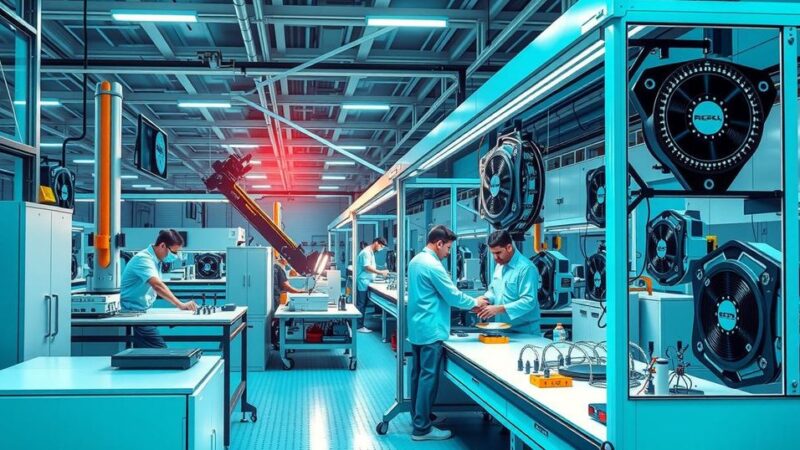As artificial intelligence usage escalates, considerable energy demands are being placed on data centers, which predominantly rely on fossil fuels. In light of climate change issues, major tech companies, including Google and Amazon, are investing in nuclear energy solutions, specifically small modular reactors (SMRs), to mitigate greenhouse gas emissions. These ventures may transform the energy landscape, possibly leading to a more sustainable framework that aligns with the increasing energy requirements of AI applications.
The surge in artificial intelligence (AI) applications has brought about a significant increase in the demand for electricity, particularly from massive data centers, which primarily rely on fossil fuels for their power needs. This trend poses a challenge for companies like Google, which aims for carbon neutrality; however, recent reports have indicated a 50% rise in their emissions over the last five years. According to projections by McKinsey, the contribution of data centers to U.S. power consumption could reach up to 12% by 2030, signifying a more than three-fold increase from current levels. The development of nuclear power offers a potential solution to this dilemma, as nuclear plants generate electricity without emitting greenhouse gases, thus being a viable alternative to fossil fuel plants. Nuclear energy can supplement renewable sources like solar and wind, providing consistent output unlike these intermittent power sources. Nevertheless, public concern surrounding nuclear disasters—exemplified by incidents at Three Mile Island, Chernobyl, and Fukushima—has hindered the expansion of nuclear infrastructure, evidenced by Germany’s closure of its last plants in favor of building natural gas facilities. Traditional nuclear energy facilities are costly and often face community opposition. The construction timeline can extend over a decade, complicating the rapid deployment necessary for meeting the urgent energy demands attributed to the rising reliance on data centers. In contrast, small modular reactors (SMRs) present a compelling alternative. These compact, factory-produced units promise quicker installation and are perceived as safer. Despite these advantages, the uptake of SMRs remains sluggish among U.S. utilities. Billionaire Bill Gates has been at the forefront of promoting SMR adoption through his company, TerraPower, which is actively constructing its first plant in Wyoming. The slow progress of nuclear infrastructure has prompted leading technology firms to take matters into their own hands. Recently, Microsoft announced a collaboration to resume operations at the Three Mile Island facility, potentially rebranding it in the process. Simultaneously, Google has disclosed plans to partner with Kairos Power for the construction of seven small nuclear reactors, the first of which is slated to become operational in 2030. Furthermore, Amazon Web Services (AWS) has committed $500 million to support three nuclear projects, inclusive of collaboration with Dominion Energy for SMR development in Virginia, and a partnership with Energy Northwest for four SMRs in Washington State. Notably, these SMRs will connect to the power grid, thereby potentially benefiting additional consumers. The implications of such initiatives extend beyond the individual projects undertaken by tech giants. If Google and Amazon successfully demonstrate that SMRs can be deployed efficiently and safely, it is likely that even slow-moving public utilities will consider these reactors as a strategy to augment energy capacity and phase out outdated fossil fuel plants. Ironically, the overwhelming energy demands of AI data centers might, in the long run, assist in diminishing greenhouse gas emissions, as nuclear technology becomes a more integral part of the energy landscape.
The increasing reliance on artificial intelligence technology is leading to escalating energy demands, predominantly supplied by fossil fuel-based power sources. In light of global climate change challenges, there is a pressing need for substantial advances in the energy sector. Nuclear energy, notably devoid of greenhouse gas emissions, poses a significant opportunity for alleviating this issue. However, historical apprehensions towards nuclear power persist due to past disasters, complicating the expansion of nuclear facilities. The advent of small modular reactors (SMRs) presents a more adaptable approach to nuclear power, yet their adoption has been limited within U.S. utility frameworks. Recently, leading tech corporations have begun investing in nuclear technology, indicating a shift towards more sustainable energy practices in response to the burgeoning energy requirements from data centers.
In summary, the growing energy demands from AI-driven data centers are prompting major technology companies to invest in nuclear power as a sustainable solution. Initiatives by firms such as Google and Amazon signal a pivotal change in energy strategy, aiming to establish small modular reactors that could significantly reduce greenhouse gas emissions. Consequently, the developments in nuclear technology and the adoption of SMRs may play a crucial role in addressing climate change while supporting the expansive energy needs of the digital era.
Original Source: www.forbes.com






